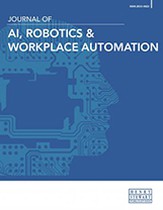Improved credit default prediction using machine learning and its impact on risk-weighted assets of banks
Abstract
The use of risk models, especially credit risk models, has been a standard for banks for many years. Banks use models not only for business decision purposes but also for regulatory purposes when comparing their risk with the available regulatory capital. Furthermore, banks need to efficiently allocate their capital in the current competitive and regulatory environments. As part of this process, they develop models to predict the probability of default (PD), which are further used to calculate risk-weighted assets (RWA). This paper gives an overview of how banks calculate RWA for credit risk. We compare the performance of traditional PD models based on logistic regression with a machine learning (ML) algorithm based on gradient boosting. This shows that an improvement in PD model performance by using ML algorithms can also lead to a decrease of RWA, therefore releasing additional capital for the banks. We developed and calibrated PD models based on logistic regression and light gradient boosting machine (GBM) approaches and compared them in terms of discriminatory power and the impact on RWA to prove this statement. This paper shows that the use of ML leads in our case study to an improvement in the model’s discriminatory power of 5 per cent in terms of Gini and releasing RWA of approximately 6.5 per cent.
The full article is available to subscribers to the journal.
Author's Biography
Martin Neisen is the global Basel IV leader of PwC and coordinates PwC’s initiative for the implementation of Basel IV. This initiative covers all aspects regarding the impact and the implementation of Basel IV, including strategic implications, standardised approaches, internal models, business implications, IT and also knowledge management. He leads the regulatory management department in PwC Europe and is our central expert in the area of Basel II/III/IV and projects regarding other regulatory topics.
Petr Geraskin is a Senior Manager in the Risk and Regulation department at PricewaterhouseCoopers (PwC) in Frankfurt am Main. His main areas of expertise include the development and validation of IRB and IFRS9 models as well as their business implications, non-regulatory credit risk modelling, RegTech and AI regulation.
